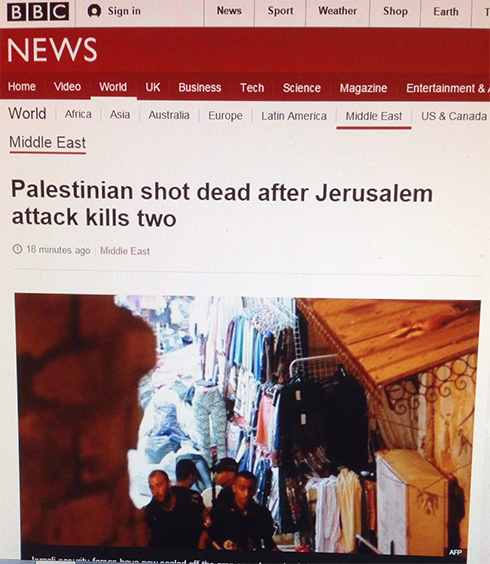Op-ed: A grossly erroneous report on last week’s Jerusalem attack seems to corroborate claims about the broadcaster’s deep-seated anti-Israel bias. It doesn’t: The real reason for the mistake is much more alarming, and it has nothing to do with Israel.
It’s happened. The BBC, the pinnacle of quality journalism, joined a string of world-renowned news networks to have grossly misreported a terror attack against Israelis. “Palestinian shot dead after Jerusalem attack kills two” read the headline on Saturday, failing to convey that the casualty was a terrorist who perpetrated a deadly stabbing and shooting attack, rather than an innocent victim.
The BBC headline is a new and unwelcome addition to what seems more like a trend than a series of isolated incidents. In November last year, a shooting spree at a Jerusalem synagogue was reported by CNN as having taken place at a mosque, and only weeks beforehand, the Associated Press led a report on a vehicular attack against Israelis with the headline “Israeli police shoot man in East Jerusalem.” Put together, these reports ostensibly reveal a fundamental anti-Israel bias: To Western journalists covering the Israeli-Palestinian conflict, violence is one directional, emanating by definition from the Israeli side and directed against the Palestinians.
Last summer, in the immediate aftermath of Operation Protective Edge, Israeli-Canadian journalist Matti Friedman published a lengthy indictment of his former employer, the Associated Press, that drew on a similar argument. Friedman, who served as Jerusalem correspondent for the reputed news agency until 2011, outlined in his Tablet magazine article the various reasons why the international media is clearly, yet in most cases unwittingly, biased against Israel.
For many Israelis and Israel’s sympathizers in the world, Friedman was barging into an open door. His suitably titled “Insider’s guide to the most important story on earth” served as a whistleblower of sorts, corroborating long-held convictions with a first-hand account. However, contrary to the reasons often evoked for this bias – from double standard to plain anti-Semitism – Friedman’s nuanced analysis demonstrated how the disproportionate attention given to Israel’s conflict with the Palestinians puts it under exacting scrutiny from which it’s very unlikely to come out unscathed.

In truth, the shortcomings decried by Friedman – that have been repeatedly confirmed since – betray something much more worrisome than anti-Israel bias. More than latent anti-Semites, the journalists who wrote these shoddy headlines were simply ignorant. They failed to grasp the very rudimentary elements of the story, and exhibited a shocking unawareness of the general context – namely, the “most important story on earth.”
This should set the alarm bells ringing for the network executives, whether in London, Atlanta or New York. The last competitive edge that remains for big news organizations, amid a seemingly endless flow of information that the Internet provides, is their ability to separate the chaff from the wheat and tell a story that is coherent and truthful. And in these cases, they demonstrated none of that.
How can professional journalists, working for renowned publications read by millions worldwide, make such embarrassing mistakes, time after time? The answer lies in a structural failure that is a direct result of the crisis that has gripped the media industry for more than a decade, and is likely to deepen even further.
The media industry has seen its traditional business model all but collapse. Once an immensely lucrative business, media outlets have been forced to cut back on costs, resulting in running skeletal operations that are based on cheaper – and therefore younger and inexperienced staff. With a 24-hour news cycle where immediacy is the name of the game, they are expected to work faster, higher, stronger – for less.
What we see is the proliferation of a custom known as “churnalism,” a portmanteau term that refers to journalists being required to produce sizable copy against increasingly tighter deadlines. To date, it has been the mainstay chiefly of local newspapers and freebies and minor-league publications, which relied on a small, multitasking staff that was bent on filling the paper’s pages. Quite regularly, press releases were copied verbatim and presented as original articles. Actual journalism – such as reporting based on sources, fact checking, etc. – were put on the backburner.
What we see here is the result “Churnalism” gradually penetrating the big, established news organizations. Positions such as special correspondents or specialized editors were abolished and replaced by a generalist news desk, consisting of editors, in many cases junior, who are now required to tackle a gamut of fields and beats. They, not the Jerusalem bureau chief, were charged with releasing the first breaking news report from Jerusalem – and the result reflects that.
The culture of dilettantism that has become the face of 21st century journalism is detrimental to the profession itself much more than Israel’s image, or any other cause that it seems to be biased against.
As reported by Business Insider
